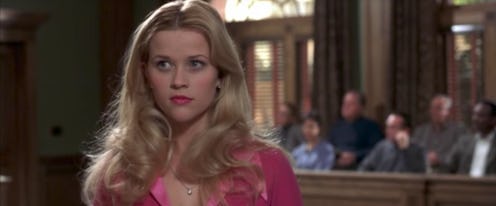Entertainment
The Movie That Made Reese Witherspoon Want To Make Feminist Films May Surprise You
In recent years, Reese Witherspoon has ramped up her call for more women in Hollywood, but it's a cause she's been working toward for longer than you probably thought. As she revealed in a recent interview with ITV, it was actually Legally Blonde that inspired Witherspoon to make feminist movies — a film that, as fans well know, was released more than 15 years ago.
"Legally Blonde opened up my life to so many little girls looking up to me," Witherspoon told the outlet. "It acknowledged that women can be strong and interesting, but also love to get dressed and have their nails done. People talk to me about it almost every week of my life."
And what she's accomplished since then is a testament to the the character who started it all. When it comes to women who have been underestimated, Elle Woods is a prime example. People assumed that because ellen was beautiful, she couldn't also be smart, or that because she cared about things like fashion and makeup, she couldn't be strong or insightful or complex. It draws an obvious parallel to the way female actors like Witherspoon are too often given one-note roles, and when they are give multi-dimensional parts, they're criticized for being either not enough or too much.
Take, for example, James Cameron's recent comments about Wonder Woman — a box office-breaking tour de force starring a woman simultaneously strong, sensitive, likable, and tough. Unfathomably, he couldn't understand how lead Gal Gadot could be both a sex icon and a badass hero. As Cameron told The Hollywood Reporter,
"I mean, she was Miss Israel, and she was wearing a kind of bustier costume that was very form-fitting. She's absolutely drop-dead gorgeous. To me, that's not breaking ground ... [But] there was nothing sexual about [original Wonder Woman Lynda Carter's] character. It was about angst, it was about will, it was about determination. She was crazy, she was complicated. … She wasn't there to be liked or ogled, but she was central, and the audience loved her by the end of the film."
But as characters like Elle have shown, women don't need to be one or the other. They are people, and they can be crazy and complicated and sexy all at the same time. But rather than waiting for the rest of the world to realize this, Elle took action: She made society see her as the intelligent, capable person she was, whether they were ready to or not.
Witherspoon has similarly taken matters into her own hands. In 2012, she and Australian filmmaker Bruna Papandrea (Warm Bodies, Milk) co-founded Pacific Standard, a production company that's housed films like Gone Girl and Wild (which Witherspoon also starred in), as well as HBO drama Big Little Lies — all projects that have been praised for their depictions of rich, divergent female characters. When she and Papandrea parted ways, Witherspoon rebranded the company as Hello Sunshine and dedicated it to telling female-driven stories. It had always been their mission, but now, it was explicit, inescapable, in your face. She was changing the conversation, and the rest of the world better keep up.
"It really came from reading all these bad scripts," Witherspoon told ITV. "I was talking to my girlfriends who are actresses, and we were like, 'There's nothing out there, they're really not making anything for us. So I thought, well then I'll start a company, self-funded, and I'll start developing roles for women. I'm really proud."
And she should be: Gone Girl and Wild are both Oscar-nominated and widely acclaimed, while Big Little Lies won a staggering eight Emmys and had the rave reviews to match. If anyone still thought putting women at the forefront didn't work, Witherspoon, just like Elle, has had a large stake in proving them wrong.
